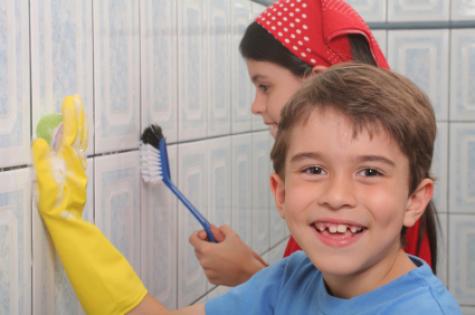Most children have some responsibility for household tasks. Depending on their age, this could be making their bed (good luck!), putting their toys away, keeping the bathroom tidy (even better luck!), unpacking the dishwasher, setting the table or a range of other things.
But with recent research showing that young Australians who leave home for the first time have very little clue on how to really clean a house, it’s also worthwhile having children help you with ad hoc housework from time-to-time.
Of course, this won’t be met with great joy – but it is worth pointing out to kids of all ages that they contribute to the overall state of the house, they live in it and it’s only fair that they help keep it clean. This doesn’t have to be a weekly activity, but just an occasional one to keep them grounded in reality, as well as give them a few tips and pointers on how to clean.
It may sound old-fashioned, but it’s also something you can do together – a communal cleaning project. Here are some tips on how to make this a happier process than it might sound.
1. Time of day
When are your kids at their best? For most, believe it or not, it’s the morning before they get started on other activities and/or start to feel tired. Tiredness for little ones is particularly a factor and for older children are fresher and more enthusiastic in the morning as well.
2. Time limit
The thought of endless cleaning or tidying is not something that brings any of us joy, so it would seem like torture to children. For each child, set a time limit on how long they are expected to clean. The time varies depending upon the nature of the job and the age of the child. Start with 15 minutes for the youngest and perhaps go up to an hour for an older teenager, depending on the nature of the task.
3. Expectations
If you approach the communal cleaning project with the attitude that all will be completed in an orderly fashion and to a high standard, then you will be disappointed. The point of the communal cleaning project is to get the children contributing to the upkeep of the household, to teach them practical skills and to enjoy each other’s company.
4. Music
It’s wonderful to have music to listen to while cleaning, so let the children choose the music. Singing while working can take away some of the dullness of the job.
5. Choice
If you’ve got more than one household job that need completing, offer the children a couple of age appropriate jobs from which they can choose. This helps them feel that as if they have some say in the process and are more likely to take full ownership of the job that they choose.
6. Demonstration
Before letting the kids start their household task, if they have not completed it before, give them a demonstration. The trick in giving demonstrations is not to talk too much. It is better to gain the child’s attention and allow them to watch you do the activity slowly. If you narrate each step, it can become information overload. After the visual demonstration, ask the child to break down the steps they need to do, so you can be sure they’ve understood you.
7. Autonomy
Once you assign a task – hopefully, selected by the child – give them the autonomy to do the job. There is nothing more disheartening for a child to have an adult come to them, take over the task and “show them how to do it properly”. This is where your expectations are also important. The purpose of this is to let the kids learn to do the tasks properly – and they may well need more than one attempt to get it right. Give the demonstration, offer guidance and tips if sought, but if you’re really unhappy with the way they did something don’t fix it then and there. Ask yourself can it wait; and if it can’t, fix it when they’ve gone to bed.
8. Encouragement
Encouragement focuses on the process, as opposed to the end result. Let the kids make their own judgment on how they have gone. It’s a good idea to use a ‘before and after’ example to get this point across. For example, show them a window they’ve cleaned and what they haven’t and give recognition for the hard work they’ve already put into what they’re doing.
9. No pay
This might seem a tough one, but if you accept the view that your kids are part of the household and it’s important for them to contribute to it, then they don’t need to be paid to help. It also avoids getting into a discussion about how much each task is worth.9.
10. Their choice
Once they’ve helped with the communal cleaning session, offer them something they’d like – such as a game of their choice to play.
Good luck! Hope this helps and you actually have some fun doing it!



















__small.png)










